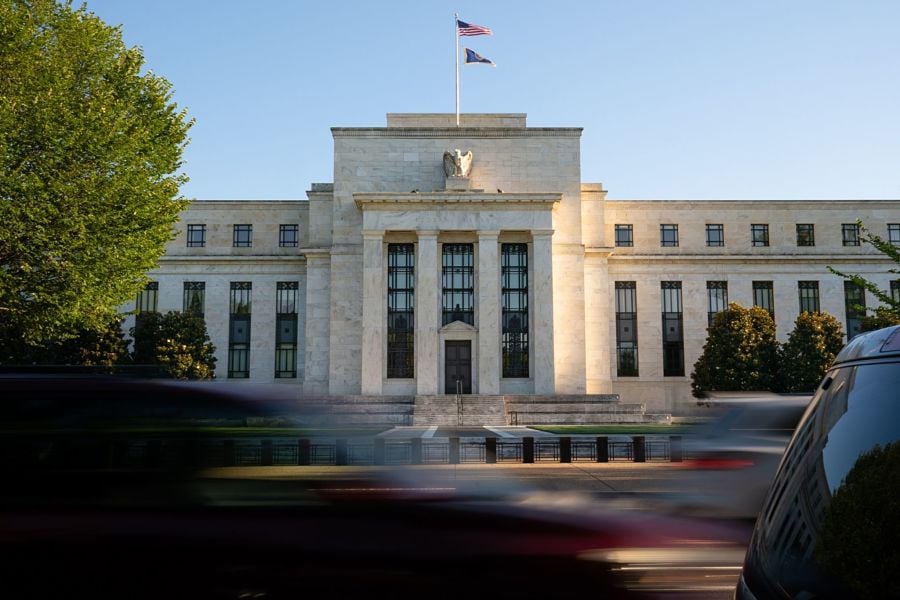

The Federal Reserve held interest rates at a 22-year high for a second straight meeting, while suggesting that the recent rise in Treasury yields may weigh on the economy and inflation.
“Tighter financial and credit conditions for households and businesses are likely to weigh on economic activity, hiring, and inflation,” the U.S. central bank’s policy-setting Federal Open Market Committee said in a post-meeting statement published Wednesday, adding the word “financial” to language that previously referred only to credit conditions.
“The extent of these effects remains uncertain,” the Fed said, repeating that it “remains highly attentive to inflation risks.”
The decision left the target range for the benchmark federal funds rate unchanged at 5.25% to 5.5%, the highest since 2001, as part of a strategy to slow the pace of rate increases as the central bank nears the end of its tightening campaign.
The S&P 500 index and Treasuries extended their rally while the dollar slipped after the announcement.
Officials made minimal changes to the statement. One tweak was to upgrade their description of the pace of economic growth to “strong” from “solid” to reflect better economic data released since their September gathering.
Policymakers repeated that, in determining “the extent of additional policy firming that may be appropriate to return inflation to 2% over time,” they would take into account the cumulative tightening of monetary policy, as well as lag effects on the economy and inflation.
Heading into the decision, traders saw a 1-in-3 chance of a 25-basis-point increase by the end of January. The FOMC meets next on Dec. 12-13 and then on Jan. 30-31.
After rapidly raising borrowing costs from near-zero levels in March 2022 to fight against inflation, officials are taking time to assess the effects of their past rate moves without ruling out further tightening.
Some officials have also said the recent surge in long-term Treasury yields may reduce the need for further rate increases.
The decision was unanimous.
Fed Chair Jerome Powell will share more insight on the decision and the outlook at a 2:30 p.m. press conference in Washington. A string of economic reports pointing to robust growth and resilient consumers is keeping pressure on officials to leave the door open to future rate hikes.
The U.S. economy expanded at a 4.9% annualized rate last quarter, the fastest clip in almost two years, as consumers splurged broadly on furniture, travel and other discretionary purchases.
A measure of underlying inflation that’s closely watched by Fed officials also accelerated to a four-month high in September, when job gains blew past expectations.
Policymakers will get another update on the employment picture Friday, when the Labor Department will release the jobs report for October.
Whether that economic strength persists or slows down is one of the biggest questions facing policymakers, and the outcome has the potential to shape the direction for inflation and interest rates.
Projections released at the Fed’s September gathering showed a majority of policymakers at the time supported one more rate increase this year. They also saw borrowing costs remaining higher for longer.
But a rise in yields since the gathering has prompted some officials, including Dallas Fed President Lorie Logan and other hawkish policymakers, to signal support for another pause in rate increases at this week’s meeting.
Many forecasters expect spending and growth to slow this quarter as larger debt payments, lower income gains and shrinking cash piles weigh on households.
Tentative agreements between the United Auto Workers union and all three of Detroit’s biggest automakers remove one economic obstacle. But officials will need to monitor other possible headwinds, including mortgage rates near 8% sidelining home buyers, a potential U.S. government shutdown and an escalating war between Israel and Hamas.
However, other policymakers say they’re concerned the surprisingly strong economy may cause inflation to remain stubbornly high for longer than officials would like to see.
“Additional evidence of persistently above-trend growth, or that tightness in the labor market is no longer easing, could put further progress on inflation at risk and could warrant further tightening of monetary policy,” Powell said in New York last month.

With its asset pipeline bursting past $13 billion, Farther is looking to build more momentum with three new managing directors.

A Department of Labor proposal to scrap a regulatory provision under ERISA could create uncertainty for fiduciaries, the trade association argues.

"We continue to feel confident about our ability to capture 90%," LPL CEO Rich Steinmeier told analysts during the firm's 2nd quarter earnings call.

It's the mega-RIA firm's third $1B+ acquisition in just three months.

The deal marks a strategic entry into private asst markets for the ETP, ETF innovator.
Orion's Tom Wilson on delivering coordinated, high-touch service in a world where returns alone no longer set you apart.
Barely a decade old, registered index-linked annuities have quickly surged in popularity, thanks to their unique blend of protection and growth potential—an appealing option for investors looking to chart a steadier course through today's choppy market waters, says Myles Lambert, Brighthouse Financial.
